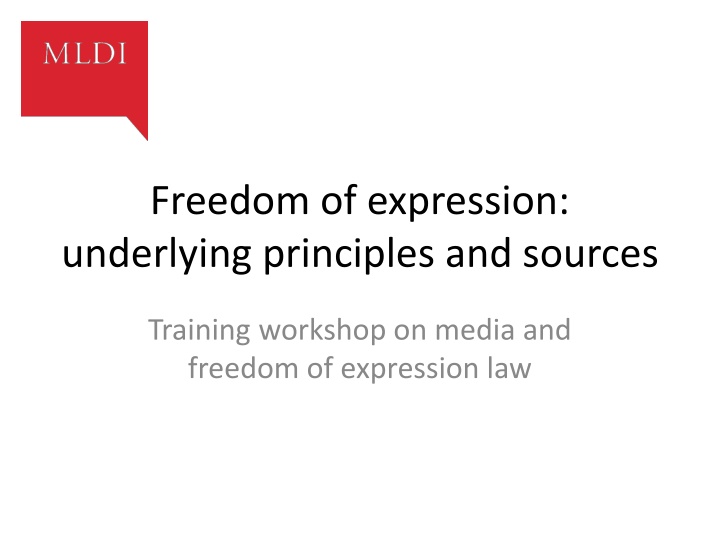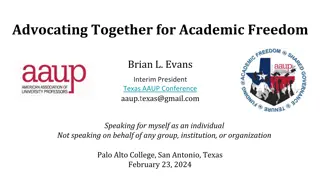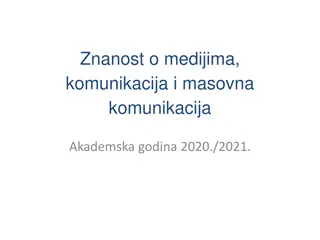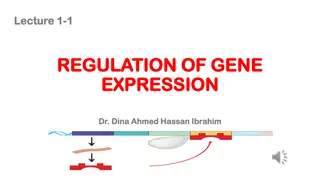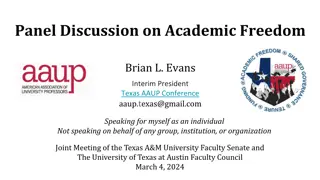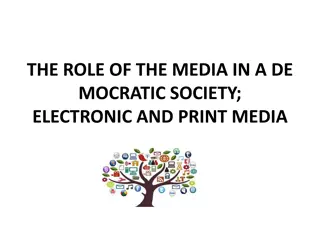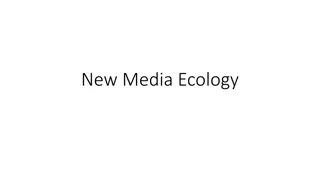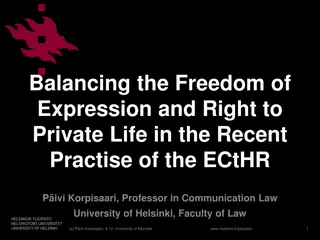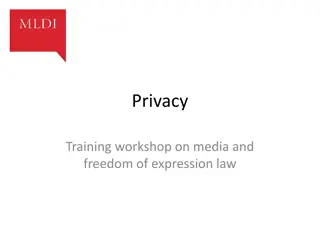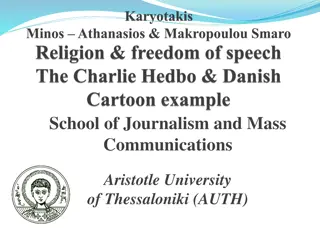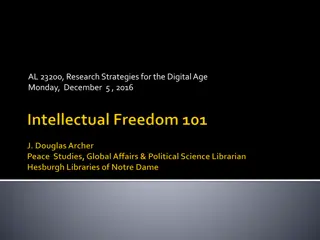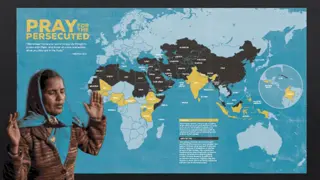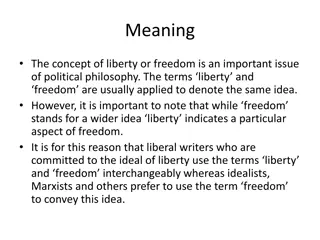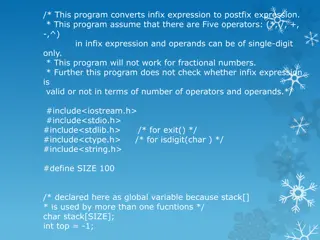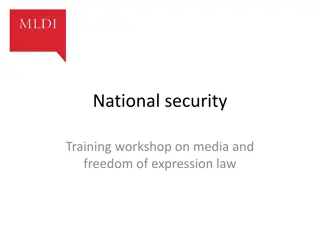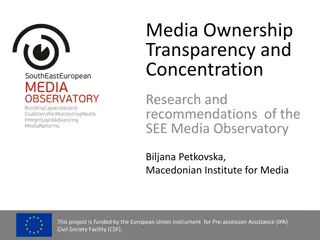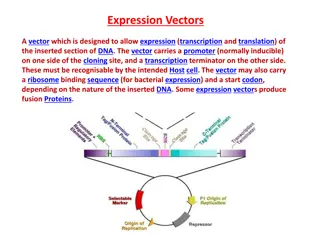Importance of Freedom of Expression and Media in Society
Everyone has the right to freedom of opinion and expression, allowing individuals to express their opinions, fight corruption, promote a healthier society, and enhance democracy and decision-making. Freedom of expression is both an individual and collective right, crucial for societal progress and upholding fundamental human rights.
Download Presentation

Please find below an Image/Link to download the presentation.
The content on the website is provided AS IS for your information and personal use only. It may not be sold, licensed, or shared on other websites without obtaining consent from the author.If you encounter any issues during the download, it is possible that the publisher has removed the file from their server.
You are allowed to download the files provided on this website for personal or commercial use, subject to the condition that they are used lawfully. All files are the property of their respective owners.
The content on the website is provided AS IS for your information and personal use only. It may not be sold, licensed, or shared on other websites without obtaining consent from the author.
E N D
Presentation Transcript
Freedom of expression: underlying principles and sources Training workshop on media and freedom of expression law
Everyone has the right to freedom of opinion and expression; this right includes freedom to hold opinions without interference and to seek, receive and impart information and ideas through any media and regardless of frontiers. (Article 19, Universal Declaration of Human Rights)
Brainstorm Make a list of reasons why freedom of expression is important.
Allows individuals to express their opinions Less corruption Freedom from hunger A healthier society Respect for environment Respect for fundamental human rights Improve national security Make the political system more democratic Make the government more efficient Lead to better decision-making Help the economy become more efficient Individuals will receive better treatment from institutions
Most of these are social benefits, not just individual ones. Hence the mass media play a crucial role in realizing the right to freedom of expression.
[Freedom of expression] requires, on the one hand, that no one be arbitrarily limited or impeded in expressing his own thoughts. In that sense, it is a right that belongs to each individual. Its second aspect, on the other hand, implies a collective right to receive any information whatsoever and to have access to the thoughts expressed by others. (Case of Herrera-Ulloa, Inter-American Court of Human Rights)
Freedom of the press affords the public one of the best means of discovering and forming an opinion of the ideas and attitudes of their political leaders. In particular, it gives politicians the opportunity to reflect and comment on the preoccupations of public opinion; it thus enables everyone to participate in the free political debate which is at the very core of the concept of a democratic society. (Castells v. Spain, European Court of Human Rights)
Question for discussion Given the importance of the freedom of expression, one approach might be to say (as the US Supreme Court often does) that it has a higher status than other rights. Would you agree with this approach? Do other judicial or international bodies share this view? And what might be the drawbacks?
We have seen that freedom of expression is important in helping to achieve other human rights, such as the rights to political participation, health, food etc. But what happens when the freedom of expression conflicts with other rights?
Brainstorm How might the freedom of expression come into conflict with other rights? Privacy Reputation Freedom from hatred or discrimination Right to a fair trial Any others?
The exercise of the rights provided for in paragraph 2 of this article carries with it special duties and responsibilities. It may therefore be subject to certain restrictions, but these shall only be such as are provided by law and are necessary: (a) For respect of the rights or reputations of others; (b) For the protection of national security or of public order (ordre public), or of public health or morals. (Article 19(3), International Covenant on Civil and Political Rights)
The list in Article 19(3) of the ICCPR is an exhaustive one, listing all the grounds on which the freedom of expression may be limited (although the European Convention provides more details).
The three-part test Any limitation of the freedom of expression must be decided according to the following test: Step 1: Any restriction on a right must be prescribed by law. Step 2: The restriction must serve one of the prescribed purposes listed in the text of the human rights instrument (on the previous slide). Step 3: The restriction must be necessary to achieve the prescribed purpose.
1. Prescribed by law Written in a law? Adequately accessible ? Formulated with sufficient precision to enable the citizen to regulate his conduct ? If not, the limitation is not permissible.
2. Legitimate aim Legitimate restrictions in Article 19(3) of the ICCPR: Rights and reputation of others National security Ordre public Public health or morals If not, the limitation is not permissible
3. Necessary (in a democratic society) Is the proposed limitation proportionate to the aim? Is it the least restriction required to fulfil the aim? Is there an overriding public interest in making the information available? A restriction may not put in jeopardy the right itself.
Scenario 1: A newspaper publishes a list of women who are alleged to have had abortions. The information comes from medical records leaked to the paper by a staff member in a clinic who is opposed to abortion on religious grounds. A number of the women whose names are published sue the newspaper for violating their right to privacy. What do you think the court should decide? One of the women is a prominent politician who is well- known for her anti-abortion views. Should the decision be different in her case?
Scenario 2: A newspaper publishes details of the business interests of the Minister of Defence (he owns a shoe factory.) The editor of the paper is arrested and charged with offences against national security. The prosecutor argues that intrusive reporting about the Minister responsible for the nation s defences will give succour to the country s enemies. What do you say?
Scenario 3: An opposition organization publishes a series of satirical cartoons about the President on its website. He is portrayed as a monkey, an alcoholic and a would-be ruler for life. The prosecutor initiates a criminal inquiry, claiming that the cartoons have defamed the President. If you were the judge, what view would you take?
